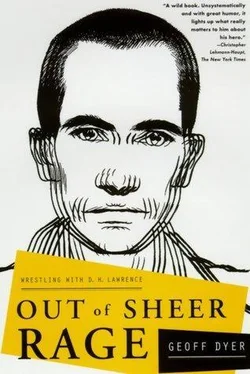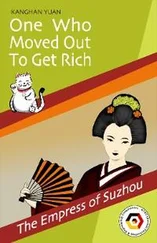Laura was sleepy in the morning.
‘I had funny dreams,’ she said, lying in the crook of my arm. ‘I kept dreaming of maps and turn-offs.’
‘I dreamt that I was back in that office, looking at the Lawrence paintings again,’ I said. ‘Then I realised it wasn’t a dream. I was in there again.’ More exactly I was watching a video of the room: just as I was leaving Saki’s office and heading for bed he had persuaded me to watch a cassette of a film that had been made about the paintings in his office. To minimise the chances of getting shown around Lawrence’s paintings again, we got up, checked out of La Fonda and set off for the Lawrence Ranch.
To the west was a great expanse of mesa and, in the blue distance, a line of mountains. To the east, sloping hills. It was windy. Clouds were stampeding across the sky. The wind bumped the car, urging it off the road. Fifteen minutes out of Taos we turned off the highway on to a gravel road. Trees were springing into bud. The vastness was behind us, in the rear-view; ahead there was the shrinking that always accompanies approach.
We stopped the car and stepped out into the wind. Compared with the places we had driven through this particular setting seemed sheltered rather than engulfed by the spaciousness celebrated by Lawrence. The emptiness lay far off, in the distance. A path led to Frieda’s grave. Behind it was the shrine built by Angelo Ravagli, where Lawrence’s ashes were buried. A nice spot. The size of a white bus shelter, the shrine had a steeply angled roof with Lawrence’s symbol, a phoenix, carved at the apex. It was easy to imagine the scene described by Auden when he came here in 1939: ‘Cars of women pilgrims go up every day to stand reverently there and wonder what it would have been like to sleep with him.’
At the back of the shrine was an altar of sorts, emblazoned with another phoenix and inscribed with the initials D.H.L. that had been printed on that other object of worship, the travelling trunk in Eastwood. There were few comments in the visitors book, mainly just names and addresses. The day before, however, someone had wondered ‘what D.H.L. and Frieda would think of today’s gender warfare. One thing I’m sure of: the macho male drivers on our highways — the ones with feet stuck to the accelerator — would have dismayed him.’
The altar itself was sprinkled with mementoes left by pilgrims: coins (Lawrence would have liked that), a credit card receipt from a store in Brooklyn, half a cinema ticket, a candle, a book of matches, a boiled sweet, an origami frog. A Boston-based attorney, John J. Pentz III, had left his business card. Several people had written personal messages on little scraps of paper. On a large piece of thick paper — from an artist’s sketchbook, I think — a poem had been written in bold black ink: ‘Words from the Eyes of the Half-Born’. I didn’t read it all the way through.
‘What do you think of it, Lorenzo?’ said Laura.
‘I don’t know,’ I said. ‘What about you?’
‘It reminds me a little of Jim Morrison’s grave in Père-Lachaise,’ she said.
Lined by pines, the path back to the ranch led our eyes over the mesa, towards the endless horizon. The wind in the trees was as loud as traffic on the freeway. Laura took a photograph, framing it so that I was standing towards the edge of the vast horizontal landscape. Clouds streamed across the sky.
A note on the door of what we took to be the ranch explained that this building was built after Lawrence had left: the house he and Frieda had lived in was the one immediately behind. We walked around there but were deterred by a vicious dog, enclosed by a wire fence deliberately designed to appear inadequate, to offer the possibility of escape. He kept appearing at different, vulnerable parts of his prison, barking, drooling. Laura said that if you held up a stone and made as if to throw it, that was enough to frighten even the fiercest dog. I picked up a rock, gestured aggressively, and the dog slunk off. A shame really: it was such a nasty dog I would like to have thrown the rock and bloodied its snout, clubbed it to death even.
Lawrence’s ranch looked in pretty bad shape. The word ‘ranch’ had made me think of something along the lines of the Ponderosa but this seemed more house than ranch, more hut than house. The roof was covered in a substance I recognised but whose name I didn’t know: a cross between tarpaulin and emery paper. It sagged somewhat, as if it was not quite itself. I thought about Lawrence and all the work, all the DIY, he had done on the house. Out of the sun it was chilly, even in mid-April, and I wondered how cold it must have been in winter, how cosy it must have looked with snow on the hills and in the trees, wood smoke drifting from the chimney.
There was a rocking chair on the porch, decorated with Indian motifs. It had a sad, waiting look that gave it the quality of a loyal dog. Nearby, propped by the door was a broom. Whether or not they had been there in Lawrence’s day — almost certainly not — that chair and broom were more expressive of his spirit than any other relics we had seen: they were things that could still be used, that existed for a purpose beyond the simple fact of their preservation.
Laura sat in the rocking chair and began rocking. The sun lurched out from behind a cloud, warming us instantly. Laura rocked back in the chair, angling her face towards the sun and wrinkling her nose in that lovely way she has. I picked up the broom and began sweeping dust from the porch. The wind had dropped. It was sunny and perfectly still. Even the trees were silent. The only sound was the noise of the chair creaking on the wooden porch, the slight rustle of the broom.
Back in San Francisco, at the Green Apple bookstore, I found a copy of Phoenix : the Penguin edition. I saw it and snatched it up in the way that one does in these circumstances, fearful that at the last moment someone else was going to beat me to it. Ten dollars — and, right next to it, was Phoenix II .
I also bought a discounted copy of Elizabeth Bishop’s poetry so that I could read ‘Questions of Travel’, the poem in which she sets out the fundamental uncertainties contemplated, at times, by all travellers.
Think of the long trip home.
Should we have stayed at home and thought of here? [. .]
What childishness is it that while there’s a breath of life
in our bodies, we are determined to rush
to see the sun the other way around? [. .]
But surely it would have been a pity
not to have seen the trees along this road,
really exaggerated in their beauty,
not to have seen them gesturing
like noble pantomimists, robed in pink.
— Not to have had to stop for gas and heard
the sad, two-noted, wooden tune
of disparate wooden clogs
carelessly clacking over
a grease-stained filling-station floor.
At various times Lawrence wondered why he had drifted so far from his inclination to sit tight: ‘What is it, makes one want to go away?’ ‘Why can’t one sit still?’ ‘Why does one create such discomfort for oneself!’ In Taormina we had wondered what was the point of going all that way to see the place where he had lived; in Mexico we had decided, effectively, that there was none. In its myriad contingencies, however, Bishop’s answer — her series of incidental answers — is close to definitive: had we not gone to Taormina we would not have heard the old man selling oregano in Furci, would not have been able to sprint across the tracks at Cisterna; had we not gone to Taos we would not have seen that road sign, ‘Gusty Winds May Exist’, would not have seen the origami frog at the Lawrence shrine or any of the other hundreds of things that we had noticed and not noticed on the way there.
Читать дальше












